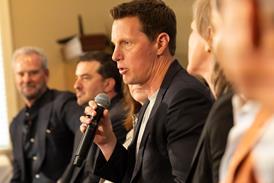The launch last summer of Msnbc Films brought not just a new player but a new type of player onto the US documentary scene.
The initiative is an off-shoot of Msnbc, the basic cable news channel (owned by Microsoft and NBC Universal) that reaches 91.6 million US TV households. And among US news networks, "it's almost the rule that you don't acquire anything from outside", notes Michael Rubin, the channel's vice-president of longform programming and production. "We're the first US cable news network we know of that is actively in the independent documentary film market looking for product."
Under Rubin's direction, Msnbc Films is open to producing, co-financing and acquiring documentaries - and, in some cases, to helping them during a festival run or theatrical release. The extent of the unit's involvement, Rubin explains, is largely determined by the needs of the project concerned. "Every deal we do is pretty much tailor-made for the film," he says.
On Dear Zachary: A Letter To A Son About His Father, for example, Kurt Kuenne's well-received feature about the murder of a friend and the subsequent custody battle for his son, Msnbc Films not only acquired the TV rights, from Submarine Entertainment, but also provided financial backing for the film's recent domestic theatrical release, through Oscilloscope Pictures.
"We helped pave the way to get them a distributor and get that film into movie houses, which is what the film-maker wanted," says Rubin. "We decided we'd be interested in getting into the feature release with them if that's what it took to get (the film) to television."
Meanwhile on Witch Hunt, Dana Nachman and Don Hardy's film (executive produced and narrated by Sean Penn) about false accusations of child abuse in a California town, Msnbc will provide an alternative to the entertainment networks that traditionally acquire documentaries for TV.
The makers of the film (also handled by Submarine) "just really wanted that documentary to be on a cable news network and not on a cable entertainment network," Rubin reports.
"Some film-makers prefer to be in that news reporting environment," he adds, "they feel like it's a better fit with their film and who they want to speak to."
What Msnbc wants from the documentary film market, says Rubin, are films with a shelf-life and a personal viewpoint. "All the films we get behind seem to be really personal, first-person documentaries. In many cases the film-maker is personally involved in the story."
And though it has taken a while for Msnbc to establish itself as a documentary buyer - its first acquisition was theatrical breakout Super Size Me in 2006 - Rubin believes that with the establishment of Msnbc Films "we're slowly but surely showing up on film-makers' radar as an option".


















No comments yet